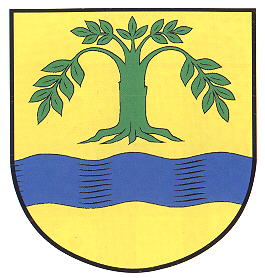Grube (Holstein): Difference between revisions
Jump to navigation
Jump to search
Knorrepoes (talk | contribs) (Created page with '{|width="100%" style="color:black; background-color:#ffffcc;" |width="15%"|50 px|left |width="70%" align="center" |'''Heraldry of the World<br/>Civic heraldr…') |
Knorrepoes (talk | contribs) No edit summary |
||
| Line 19: | Line 19: | ||
The arms were officially granted on December 31, 1938. | The arms were officially granted on December 31, 1938. | ||
The arms are based on the oldest known seal of the city, dating from the 14th century. Although the tree is not | The arms are based on the oldest known seal of the city, dating from the 14th century. Although the tree is not specified, it is presumed that it is a beech, as the name of the town may have been derived from the Slavic word for beech. | ||
The wavy bar symbolises the Grube Lake. The gold refers to the once prosperous trading city (14th-16th century). | The wavy bar symbolises the Grube Lake. The gold refers to the once prosperous trading city (14th-16th century). | ||
Revision as of 09:30, 29 December 2010
| Heraldry of the World Civic heraldry of Germany - Deutsche Wappen (Gemeindewappen/Kreiswappen) |
GRUBE
State : Schleswig-Holstein
District (Kreis) : Olsholstein
Official blazon:
In Gold über einem blauen Wellenbalken ein bewurzelter grüner Laubbaum.
Origin/meaning :
The arms were officially granted on December 31, 1938.
The arms are based on the oldest known seal of the city, dating from the 14th century. Although the tree is not specified, it is presumed that it is a beech, as the name of the town may have been derived from the Slavic word for beech.
The wavy bar symbolises the Grube Lake. The gold refers to the once prosperous trading city (14th-16th century).
Literature : Reissmann, 1997

